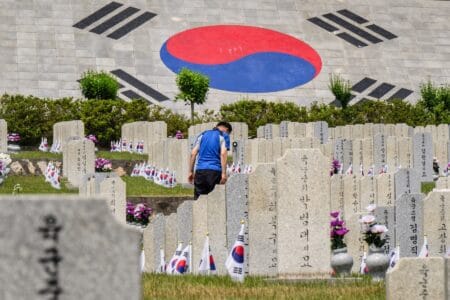August 20, 2025
SEOUL – Most Korean adults can handle basic digital devices without major difficulty, but the digital literacy gap remains significant for older people, those with lower education levels and households with smaller incomes, a new government survey shows.
According to the Ministry of Education’s first-ever adult digital literacy survey, released Tuesday, 8.2 percent of adults — about 3.5 million people — struggle with even the most basic use of smartphones, computers and digital kiosks. A further 17.7 percent, or about 7.6 million people, can operate devices but fall short of applying them effectively in daily life.
By contrast, 52.8 percent of adults are assessed as “Level 4,” meaning they can skillfully use digital tools to solve everyday problems, such as navigating maps, booking train tickets and conducting online banking.
The survey revealed sharp disparities depending on age, education and income.
Nearly 1 in 5 adults over the age of 60 was classified at the lowest digital literacy level, compared to less than 1 percent of adults aged 18 to 39. More than one-third (34.6 percent) of adults with a middle school education or less were placed at the lowest level of using and understanding digital devices, as were almost 26 percent from households earning under 3 million won ($2,160) a month.
Women, rural residents and those with less schooling also showed higher proportions of difficulty with digital tools. In contrast, 70.5 percent of university graduates and 69.2 percent of those from households earning over 5 million won were rated at the highest competency level.
Nearly all adults — 97 percent — said their primary use of digital devices was to keep in touch with family, friends and acquaintances.
Beyond communication, 84.8 percent relied on smartphones or computers for searching everyday information, 84.4 percent for leisure activities such as watching YouTube, and 70.8 percent for online shopping and digital payments.
At the same time, growing recognition of the need for structured support to help those left behind was shown. About 30 percent of adults said digital literacy education programs are necessary. Among them, nearly two-thirds expressed willingness to participate if such opportunities were provided.
The ministry said it will expand targeted digital literacy programs, including the “Hangeul Sunshine Bus,” a mobile education service bringing hands-on training to seniors and rural communities. Other measures include partnerships with banks and retailers for on-site practice using ATMs and digital kiosks, and expanded lifelong learning vouchers for low-income and older adults.
Deputy Education Minister Choi Eun-ok said the findings shed light on the extent and characteristics of digital exclusion in Korean society. “The ministry will work to ensure that even those unfamiliar with digital tools are not left behind in daily life amid the rapid pace of technological change,” she said.







